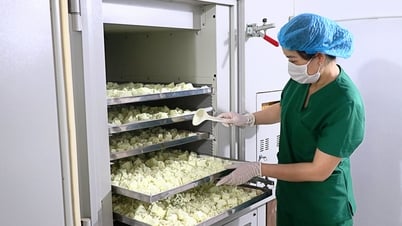Rich in cholesterol and saturated fat
The amount of cholesterol in 100 grams of pork intestines can be up to 270mg - 500mg, while the American Heart Association (AHA) recommends that adults should not consume more than 300mg of cholesterol per day.
Saturated fat and high cholesterol levels increase LDL-cholesterol levels - a leading risk factor for atherosclerosis, high blood pressure, heart attack and stroke. This harm is especially serious for people with cardiovascular disease, diabetes or lipid disorders.

High purine content – can cause gout
Pig intestines, liver, and heart are all organs that contain a lot of purines, which when entering the body will be converted into uric acid. High levels of uric acid in the blood can easily cause gout. For people who have had gout, eating pig intestines can easily cause the disease to flare up again and become difficult to control.
Pork intestines with alcohol - a dangerous combination
In bars, offal is often eaten with alcohol. This is a harmful combination that many people do not pay attention to. Alcohol makes the liver work harder to eliminate ethanol, while also slowing down the process of eliminating uric acid.
When combined with purines and cholesterol from offal, the liver is overloaded, easily leading to chronic hepatitis, impaired liver function, and even cirrhosis if repeated frequently.
Pork intestines contain poor quality protein
Although it contains protein, the protein in pig intestines is mainly elastin and collagen – proteins that are more difficult to digest than skeletal muscle protein found in lean meat or fish. In people with weak digestive systems, these proteins can easily cause bloating and indigestion.

Food safety risks
In fact, pig intestines contain many bacteria and parasites because this is the part of the intestine that contains digestive waste. They often contain many bacteria such as Salmonella, Campylobacter, E.coli or worm eggs.
If not thoroughly cleaned and cooked, the eater may suffer from acute diarrhea, food poisoning or parasitic infection.
In addition, unsafely processed pork intestines are a link in the chain of disease transmission from animals to humans. Among them are some diseases such as hepatitis E, influenza A/H1N1, Streptococcus suis (causing meningitis, sepsis).
People who directly prepare or consume raw or undercooked organs are at risk of infection.
Pork intestines are food that spoils easily and is susceptible to bacteria due to their soft, vascular and moist structure. In case of pigs Exposure to antibiotics, growth hormones, heavy metals, internal organs will be the place where these toxins accumulate.
In addition, some production facilities may use unsafe substances such as alum, borax, hydrogen peroxide or industrial bleach to help make the pig's intestines white, crispy and chewy.
These substances irritate the intestinal and stomach lining and cause liver and kidney dysfunction if accumulated over a long period of time. This increases the risk of digestive system cancer.
Doctor's recommendation
Do not eat pig intestines and animal organs regularly. Each time you eat, limit the amount to less than 100 grams. Do not use pig intestines and animal organs as main dishes regularly.
Avoid pork offal completely if you are at high risk: high blood cholesterol, high blood pressure, cardiovascular disease, diabetes, gout, fatty liver or kidney failure.
Do not use pork intestines of unknown origin. Do not eat intestines that have a strange smell, are dark gray or slimy.
If you eat offal, prioritize eating vegetables first to aid digestion, increase fiber, and limit cholesterol absorption.
When preparing, wash several times with salt water, vinegar or lemon, boil thoroughly the first time, remove and wash again before processing. Cook thoroughly to kill bacteria and worm eggs. Do not eat offal with alcohol, minimize processing with oil.
Source: https://www.sggp.org.vn/su-that-ve-loai-dac-san-van-nguoi-me-post794250.html


![[Photo] Hungarian President begins official visit to Vietnam](https://vphoto.vietnam.vn/thumb/1200x675/vietnam/resource/IMAGE/2025/5/27/ab75a654c6934572a4f1a566ac63ce82)


![[Photo] Vice President Vo Thi Anh Xuan, French President Emmanuel Macron and his wife visit Hanoi University of Science and Technology](https://vphoto.vietnam.vn/thumb/1200x675/vietnam/resource/IMAGE/2025/5/27/267b6f2bdf3e46439f081b49f6ec26b1)




















































































Comment (0)